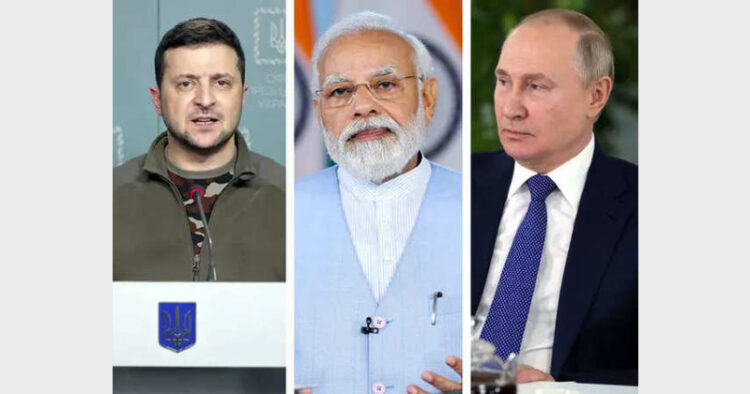New Delhi may activate its diplomacy to mediate between Kyiv and Moscow and help them defuse their present tension. India, the world's largest democracy, does have the potential to help in the matter.
In a significant development on March 21, Ukrainian President Volodymyr Zelensky said in a media interview that he was ready to meet his Russian counterpart Vladimir Putin "in any format" and discuss even the status of Russian-occupied Crimea and Russian-backed statelets in Donbas.
This statement of Zelensky is in sharp contrast with what he had said in a virtual speech to the US Congress on March 16. In that address, he said, "I need your decision, your help… to create a no-fly zone over Ukraine, .. (so that) Russia would not be able to terrorise our free cities…"
He said, "This is a terror that Europe has not seen for 80 years…Remember Pearl Harbour.. of December 7, 1941, when your sky was black from the planes attacking you.. Remember September 11, when evil tried to turn your cities, independent territories, in battlefields.." On its part, Kremlin has also shown its willingness to have 'active and substantial talks' with Ukraine aimed at ending Russia's military action in the country.
Observers say the changing approaches of Kyiv and Moscow offer a conducive atmosphere for the United Nations and the world's major democratic states to come forward and mediate between Zelensky and Putin to defuse the Ukrainian crisis.
Given the history of its almost dismal performance in ensuring peace in various parts of the world, the United Nations cannot be expected to contribute much to restoring peace in the present case. Nor can the democratic states, such as the United States, Canada, Japan, and the European Union, be in this regard. In the present crisis, they have extended their support to Ukraine in the United Nations and gone with the US-led sanctions against Russia. Moscow is highly unlikely to accept their mediation in the matter.
However, India, the world's largest democracy, does have the potential to help in the matter. New Delhi has had the tradition of working for peace in the world. More importantly, India has a balanced, reasonable, pacifist approach in the current Ukrainian crisis. New Delhi has abstained from voting on the US-led UN resolutions critical of Russia. But at the same time, it has called for an end to the conflict.
New Delhi may activate its diplomacy to mediate between Kyiv and Moscow and help them defuse their present tension. In this diplomacy, Prime Minister Narendra Modi may also involve some Opposition Members of Parliament, who seem to have an enlightened understanding of the imperatives of the contemporary world in general and of Ukraine and Russia in particular.
Prime Minister Modi is arguably the most suitable world leader to mediate between Zelensky and Putin today. He could rope in other important world leaders, including Israeli Prime Minister Naftali Bennett, in the proposed diplomacy of mediation. Israel today enjoys very strong relations with Ukraine and Russia. Prime Minister Bennett has been friendly to both Presidents Putin and Zelensky. Both Zelensky and Putin may heed his advice.
(The author is a New Delhi-based journalist)














Comments